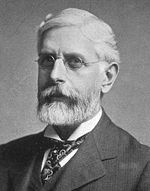From CNN:
"Having a disease named after you is a decidedly mixed bag. On the one hand, your scientific developments are forever commemorated. On the other hand, though, you're stuck with the knowledge that no patient will ever be happy upon hearing your name."

Daniel Elmer Salmon (1850 – 1914) was a veterinary surgeon. He earned the first D.V.M. degree awarded in the United States, and spent his career studying animal diseases for the U.S. Department of Agriculture. He gave his name to the Salmonella genus of bacteria, which were discovered by an assistant, and named in his honor. Image source: Wikipedia, public domain.
New medical conditions that are being discovered are not named after scientists or physicians anymore. The eponymous system is non-descriptive and generally confusing.
References:
"Having a disease named after you is a decidedly mixed bag. On the one hand, your scientific developments are forever commemorated. On the other hand, though, you're stuck with the knowledge that no patient will ever be happy upon hearing your name."

Daniel Elmer Salmon (1850 – 1914) was a veterinary surgeon. He earned the first D.V.M. degree awarded in the United States, and spent his career studying animal diseases for the U.S. Department of Agriculture. He gave his name to the Salmonella genus of bacteria, which were discovered by an assistant, and named in his honor. Image source: Wikipedia, public domain.
New medical conditions that are being discovered are not named after scientists or physicians anymore. The eponymous system is non-descriptive and generally confusing.
References: